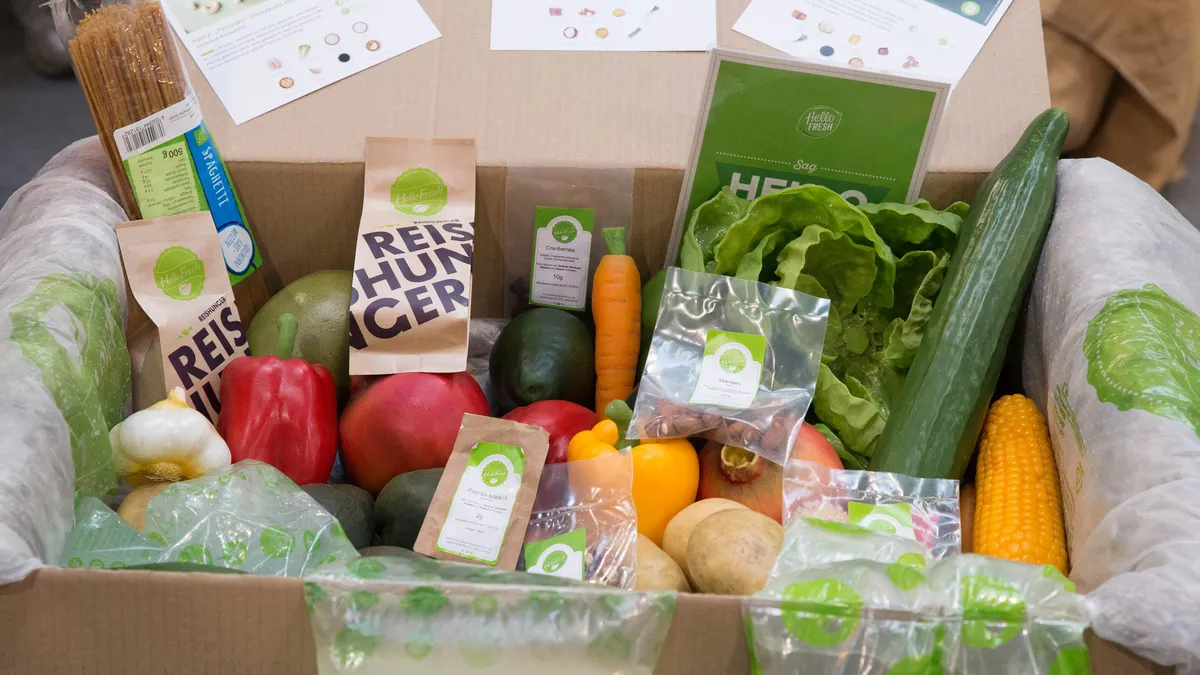Dive Brief:
-
Concerned by high operating costs and the lack of a clear path to profitability, many investors are passing on meal kit companies right now, reports the Wall Street Journal.
-
The Journal noted that in 2015, investors made 25 deals worth $308 million, versus 18 deals worth $274 million last year.
-
Over the past five years, 150 new meal kit companies have launched, the article stated, and despite their initial hunger for the easy-to-fix meals, customers aren't committing long-term. Seventy percent of Blue Apron customers stop regularly buying meals after six months, and more than 80% of HelloFresh customers weren’t active, according to an Emory University professor who studies the meal kit market. The article noted that at least four meal-kit companies have closed and several have been acquired, most notably Plated, which was bought by Albertsons last fall.
Dive Insight:
Have meal kits lost their flavor? It seemed like a great idea at the time, when startups like Blue Apron espoused the concept of fixing meals with the benefit of both worlds: the satisfaction of cooking at home but with the convenience of selecting tasty recipes and having perfectly proportioned ingredients delivered to the doorstep. In 2016, one in four adults purchased meal kits, and companies like Blue Apron and Plated grew from startups into multimillion dollar companies.
Fast forward to today, and Blue Apron’s stock has plummeted more than 50%, Plated was acquired by Albertsons, and competition from other meal kit companies as well as other grocers is crowding the market. Customer acquisition costs are high—as much as $80 per person — and retention is low.
The Wall Street Journal points out that the sector is still expected to grow to more than $6 billion by 2021, but investors are slowing their roll, concerned about the downturn in sales and wondering how retail players like Amazon, Walmart and Kroger will shake up the competition.
Meal kit companies are responding by looking at new ways to differentiate themselves, whether offering plant-based, organic, or healthy meals or by putting those offerings in eco-friendly packages. But is differentiation enough?
There is some good news for meal kit companies. Consumers continue to look for convenience when it comes to meal planning and preparation. With younger shoppers increasingly shopping online yet also wanting fresh, healthy options, the ease of meal kits would seem to be a winning solution.
Meal kit companies are responding with more easy, quick-prep meals, and they suggest that more consumer education is needed to get shoppers on board with the products. However, in the intensely competitive market sector, meal-kit companies may feel the need to demonstrate quick wins versus waiting for consumers to catch up with the trend.
Grocers entering the meal kit market offer the advantage of on-demand kits and low prices. If meal kit companies like Blue Apron want to keep their place at the table, they will need to find a way to lower manufacturing and marketing costs, while at the same time find ways to entice first-time customers to become long-time users. Until that happens, look for many more startups to drop out of the business as the industry shakeout begins.








